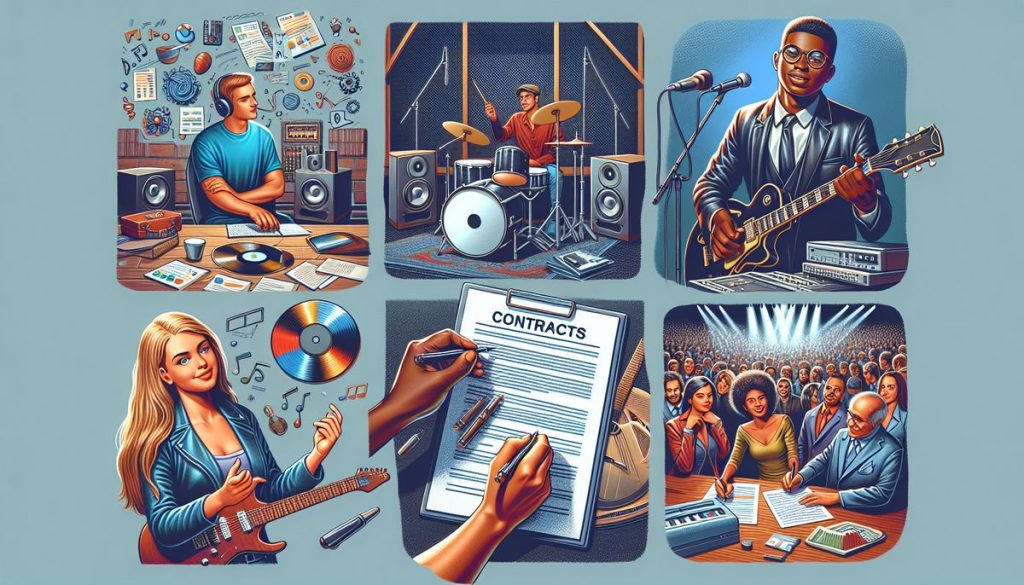Navigating the Beat: Understanding Copyright and Trademark Law for Aspiring Musicians
Written by DJ Prodigee on Tue Feb, 2024
For aspiring musicians, understanding the legalities of copyright and trademark law is as crucial as mastering scales and harmonies. Navigating the complex landscape of intellectual property rights can be daunting, but it’s essential for protecting your work and ensuring your career can flourish without legal setbacks. This article serves as a guide through the intricacies of these laws, ensuring that your creative journey strikes the right chord with both your audience and the legal standards of the industry.
Key Takeaways
- Understanding copyright law is fundamental for musicians to protect their original works and avoid infringement.
- Trademark law is vital for safeguarding band names, logos, and merchandise, which are key to a band’s brand identity.
- Aspiring musicians must navigate monetization strategies carefully to ensure they comply with copyright and trademark laws.
- Online music sharing presents legal challenges; knowing the boundaries of copyright law is necessary to prevent piracy.
- Consulting with music lawyers can help avoid legal pitfalls and ensure that the rights to your music are fully protected.
Copywrong or Copyright? The Musician’s Dilemma
The Secret Sauce of Creative Ownership
Let’s cut to the chase: owning your music is like having the only key to the treasure chest of your creativity. It’s your personal goldmine, and you don’t want any sneaky pirates swiping your doubloons. So, what’s the secret sauce? It’s a zesty blend of copyright and intellectual property rights that keeps your tunes from being the next free-for-all at the internet’s potluck.
- Copyright: It’s your VIP pass to the creativity party.
- Intellectual Property: All the cool stuff you create, including that catchy hook you hummed in the shower.
But remember, without a clear agreement, you might all end up with just crumbs.
Collaboration is like a potluck dinner, and everyone’s hungry for a slice of the pie. Before you start divvying up the royalties, make sure you’re not left holding the bag while everyone else runs off with the goodies. And hey, if you’re feeling lost in the legal sauce, don’t forget to consult the pros. They’re like the GPS for your copyright journey, ensuring you don’t drive off a cliff into infringement territory.
Remixing: It’s a Remix, Not a Free Pass
So you’ve decided to take a classic track and sprinkle your own spicy beats on it, huh? Well, before you unleash your masterpiece to the world, let’s get one thing straight: remixing is not a ‘get out of jail free’ card. It’s like adding a mustache to the Mona Lisa and calling it original—copyright law won’t be impressed.
Here’s the lowdown on remixing without getting remixed by the law:
- Sampling: Clear it before you rear it. Get permission, or get ready for a courtroom drama.
- Covering: Pay the piper (aka licensing fees) to play someone else’s melody at your gig.
- Transformative Use: Did you turn that 3-second clip into a post-modern symphony? You might be in the clear.
Pro tip: Don’t just sample, innovate! Make that borrowed beat your own, and you might just avoid the legal blues.
Remember, not all heroes wear capes, some just have really good lawyers. So whether you’re remixing, rewriting, or just reveling in your own genius, understanding copyright is crucial. It’s the difference between your song being a hit on the charts or just a hit with your mom (love you, mom!).
Pro Tip: Don’t Just Sample, Innovate!
Sampling is like that one friend who says they’ll help you move and then just ends up eating all your pizza. It’s tempting to use a killer beat from another song, but if you want to avoid a courtroom conga line, you’ve got to do more than just hit ‘copy’ and ‘paste’. Transform that tune into something unrecognizably groovy and you’ll not only dodge legal bullets but also earn some serious street cred.
- Protect your music: Enforce trademark, get sample clearance, use parody legally.
Here’s the skinny on staying out of hot water:
- Clear your samples like you clear your browser history: thoroughly and often.
- Remix with a twist—add your own flavor to the mix.
- Innovate, don’t imitate. Make that beat your own and watch your music soar.
Remember, a good artist borrows, but a great artist steals… and then disguises it so well that even Sherlock Holmes couldn’t tell. But seriously, innovation is key to keeping your music yours and your record label happy.
Trademark Tunes: Branding Your Band Beyond the Music
Your Logo: More Than Just a Pretty Face
LOGO SCHMOGO: PROTECTING YOUR VISUAL VIBE
So you’ve got a logo that’s more eye-catching than a neon sign at a Las Vegas buffet. But is it protected? That’s the million-dollar question, my friend. Your band’s logo is like your flag, waving high in the sea of fans. It’s not just a doodle on a napkin—it’s your brand, baby!
- First, check if your logo is truly original. You don’t want to be ‘that band’ who accidentally ripped off the Rolling Stones’ tongue.
- Next, trademark that bad boy. It’s like putting a padlock on your bike in the city.
- Finally, enforce it. If you see your logo on some knockoff t-shirts, it’s time to unleash your inner legal eagle.
Remember, protecting your visual vibe isn’t just about keeping your art safe; it’s about ensuring your merch table isn’t confused for a flea market stall.
- Protect your work: Copyright it, and don’t just rely on a pinky promise from your bandmates.
- Know your rights: Understand what you can and can’t do with your music. No, you can’t just sample Beyonc\u00e9 because it’s ‘flattering’.
- Build your brand: Your music is awesome, but can people recognize it’s you? Get that logo and slap it on everything short of your grandma’s forehead.
Merch Madness: Protecting Your Swag
Merchandising is a key aspect of a musician’s brand, and it’s not just about slapping your name on a mug. It’s about creating a connection with fans that extends beyond the music. But beware, the road to merch glory is littered with legal landmines. Here’s a quick rundown of what to keep an eye on:
Imagine walking down the street and spotting a complete stranger sporting a T-shirt with your face plastered across it. It’s a mix of flattery and a ‘what the heck?’ moment. Merch can be a musician’s best friend or a bootlegger’s day job. It’s all fun and games until someone slaps your logo on a knockoff onesie and starts selling it out of their trunk at your own concert.
So you’ve got fans clamoring for a piece of you, and you’re ready to slap your face on everything from tees to toasters. But hold up, Picasso! Before you turn your merch table into a free-for-all bazaar, let’s talk about keeping it kosher with your goods. Merchandising is a legal minefield, and you don’t want to be the one playing catch with a lawsuit grenade.
- First, check if your logo is truly original. You don’t want to be ‘that band’ who accidentally ripped off the Rolling Stones’ tongue.
- Next, trademark that bad boy. It’s like putting a padlock on your bike in the city.
- Finally, enforce it. If you see your logo on some knockoff t-shirts, it’s time to unleash your inner legal eagle.
Remember, protecting your visual vibe isn’t just about keeping your art safe; it’s about ensuring your merch table isn’t confused for a flea market stall.
And let’s not forget about quality. Nobody wants a t-shirt that turns into a crop top after one wash. Invest in good materials and reputable manufacturers. Your fans will thank you, and your merch will become the stuff of legend, not landfill.
Name Game: Making Sure Your Band Name Rocks Legally
Picking a band name is a bit like choosing a tattoo – it’s going to be with you for a long time, and it’s how your adoring fans will chant your glory. But before you get that name up in lights, you’ve got to make sure it’s not going to land you in a legal mosh pit. Your band’s name is your identity, and it’s worth doing a bit of homework to ensure it’s truly yours.
Here’s a quick checklist to dodge those legal landmines:
- Google is your first line of defense. A simple search can save you from future headaches.
- Social media is the modern-day billboard. If your chosen name is plastered all over someone else’s Instagram, it’s time to brainstorm again.
- Trademark databases are the gatekeepers. If your name’s already on the list, you’re not getting in without a fight.
Remember, a unique band name isn’t just about standing out. It’s about legally owning your brand and avoiding the courtroom tango.
And let’s not forget, once you’ve cleared the name, it’s time to trademark that gem. It’s like putting a protective spell on your band’s soul. So, before you print a single T-shirt or slap that name on a bass drum, make sure you’re not stepping on any legal toes. Because let’s face it, the only battle you want to be fighting is for the top of the charts, not in court.
Fair Use or Foul Play? The Thin Line
Cover Songs and Copyright: A Love-Hate Relationship
Ah, cover songs. They’re like that ex you can’t decide if you love or hate. You want to belt out your own spicy version of a classic hit, but there’s a catch: copyright law. It’s the party pooper that might slap you with a lawsuit faster than you can say ‘tribute’.
Covering a song is like walking a tightrope over a pool of legal sharks. Do it right, and you’re the darling of karaoke night. Do it wrong, and you’re chum. Here’s the skinny on staying in the clear:
- Get a license: It’s your golden ticket to cover-song Wonderland.
- Pay the piper: Royalties are a must unless you want to be a musical outlaw.
- Credit where credit’s due: Always tip your hat to the original maestro.
Remember, not all heroes wear capes, some just have really good lawyers.
So, before you go making someone else’s hit your own, make sure you’re not stepping on any legal landmines. After all, imitation might be the sincerest form of flattery, but in the music biz, it’s also the quickest way to get sued.
Online Sharing: Sharing is Caring, But Don’t Get Sued
Sharing your tunes on social media is like walking a tightrope over a pool of hungry lawyers. Do it right, and you’re a star; slip up, and you’re shark bait. Here’s the skinny on keeping your online sharing legit and your bank account lawsuit-free.
Here’s a quick rundown of do’s and don’ts:
- DO: Use social media to showcase your original work and connect with fans.
- DON’T: Post copyrighted material without permission. That’s a no-no.
- DO: Understand the platform’s terms of service—ignorance isn’t bliss, it’s a lawsuit waiting to happen.
- DON’T: Assume that ‘sharing’ means ‘free for all.’ Even retweets can ruffle some legal feathers.
Remember, kids, in the wild world of the web, it’s better to be safe than sorry—or worse, sued.
Remember, while sharing is caring in kindergarten, in the world of music, it’s a no-go. Stick to the straight and narrow, and let’s keep the tunes legit!
Educate to Innovate: Staying Legal in the Creative Process
For the rhythmically gifted and legally challenged, here’s the lowdown: educating yourself on copyright and trademark law is like learning to play an instrument—it takes practice, but it’s a symphony of security once you’ve got it down. Think of it as your legal scales; the more you know, the better you can compose without hitting a sour note with the law.
- Understand the legal aspects of music creation.
- Learn the importance of copyrights and trademarks.
- Consult with music lawyers to avoid legal pitfalls.
Remember, just because you can do something doesn’t mean you should. That’s a life lesson and a legal one.
And hey, if you’re still feeling like a deer in legal headlights, consider this your cue to phone a friend—preferably one with a law degree. Because sometimes, the best beat is the one that doesn’t land you in court. So, keep your creative juices flowing, but let’s not spill them all over copyright infringement, okay?
Show Me the Money: Monetizing Music Without Misdemeanors
Royalties and Rights: Getting Paid Without Getting Played
So, you’ve crafted a tune that’s catchier than the common cold, and now you’re ready to see some green for your genius. But hold your horses, Beethoven—getting paid in the music world is more complex than a prog rock opera. Royalties are the bread and butter of your bank account, but they come in different flavors, and you need to know your mechanical from your performance royalties like you know your bass from your treble.
Remember, knowledge is power, and in the music biz, it’s also the difference between getting paid and getting played.
Here’s the lowdown on the dough-down: Mechanical royalties are what you get when someone presses play on their device, and performance royalties chime in when your jam plays at a venue or on the radio. And if you’re lucky enough to have your track featured in a movie or a commercial, that’s when sync fees enter the stage, doing a little victory dance.
But wait, there’s more! If your mug is merch-worthy, you might also rake in some cash from fans donning your duds. Just make sure you’re not doling out dollars to Captain No-Beard for pirating your look. Here’s a quick cheat sheet to keep your eyes dry while reading the fine print:
- Rights and Royalties: Who gets what and when? Make sure your future yacht isn’t just a dinghy in disguise.
- Term and Termination: How long are you hitched to this label wagon? And how do you jump off without breaking your legs?
- Creative Control: Can you keep your artistic soul, or does the label get to bedazzle your album cover?
Licensing Labyrinth: Navigating the Maze of Music Monetization
Welcome to the jungle, we’ve got fun and games, but when it comes to licensing your music, it’s more like a maze where the cheese is a big fat paycheck. Navigating the world of music licensing can feel like trying to solve a Rubik’s Cube blindfolded. But fear not, my tuneful friends, for I shall bestow upon you the Four Paths to Music Licensing Success.
First up, we’ve got the straight shooters, those who license directly to users like TV shows, films, and commercials. Then there are the middlemen, the music libraries and stock music providers who act like your cool aunt, setting you up on blind dates with potential licensees.
Next, we have the digital platforms, where you can upload your music and pray to the algorithm gods for favor. And lastly, the live performers, who need to secure performance rights before belting out that killer cover at the local dive bar.
- Direct Licensing: TV, Film, Commercials
- Music Libraries: Stock Music Providers
- Digital Platforms: Streaming Services
- Live Performance: Cover Song Rights
Remember, it’s not just about making music; it’s about making money without getting sued into the Stone Age.
Consult the Maestros: Why Music Lawyers Rock
Alright, you musical maestros and legal laymen, it’s time to face the music. When it comes to the legal side of your tunes, you might think you can wing it with a DIY attitude, but here’s where music lawyers come in with their face-melting solos. They’re the unsung heroes who make sure your tracks don’t hit a bum note in the courtroom.
- Understand the legal aspects of music creation.
- Learn the importance of copyrights and trademarks.
- Consult with music lawyers to avoid legal pitfalls.
- Emphasize financial literacy for emerging artists.
Remember, knowledge is power, and in the music biz, it’s also the difference between getting paid and getting played.
So, before you shred that next riff, make sure you’re not shredding your legal rights along with it. Music lawyers are like the bassists of the band – often overlooked but absolutely essential for keeping the groove going. They’ll help you navigate the treacherous waters of the music industry, from copyright infringement to the complexities of music licensing. And let’s be real, who wouldn’t want a rockstar lawyer in their corner when the legal mosh pit starts?
The Beat Goes On: Keeping Up with Copyright and Trademark Laws
Staying Tuned: Keeping Your Legal Knowledge Fresh
Let’s face it, the only thing that changes faster than the charts is copyright law. So, how do you keep up without feeling like you’re trying to read sheet music in a mosh pit? First, bookmark those legal sites that make the complex stuff as easy to understand as a nursery rhyme. Next, get cozy with the Intellectual Property rights that protect your tunes from being the next free hit on the download charts.
- Subscribe to legal newsletters specific to the music industry.
- Attend webinars and workshops hosted by music law experts.
- Join forums and social media groups where musicians share legal tips and experiences.
Remember, kids, in the wild world of the web, it’s better to be safe than sorry—or worse, sued.
Lastly, don’t be that artist who learns about copyright law the hard way—by receiving a cease and desist during your world tour. Stay informed, stay legal, and keep your music playing on the right side of the law.
Global Groove: Understanding International Music Laws
So you’ve got your tunes ready to conquer the world, but before you go on a global tour, let’s talk about those pesky international music laws. It’s like trying to play a guitar solo with mittens on—tricky, but not impossible. Navigating the legal landscape across borders is like doing the Macarena at a polka party—you’ve got to know the steps, or you’ll trip up!
Italics might be the skinny jeans of text formatting, but when it comes to international copyright and trademark laws, they’re no fashion statement. Each country has its own set of rules, and they can be as different as death metal and a ukulele cover band. Here’s a quick hit list to keep you in tune:
- Know the local laws: Don’t assume what works at home will fly abroad.
- Respect the rights: Just because you can find it online doesn’t mean it’s free to use.
- Seek professional help: A good lawyer can save you from a world tour of courtrooms.
Remember, the goal is to have your music heard around the world, not to have your name echo through the halls of international courts. So, study up, stay sharp, and keep your band’s brand legally rocking on every continent!
Future-Proof Your Music: Anticipating Legal Changes in the Industry
In the ever-twisting saga of the music industry, staying ahead of legal changes is like trying to predict the next big fashion trend – just when you think bell-bottoms are back, everyone’s into skinny jeans. But one thing’s for sure: the law never stays still for long. So, how do you keep your tunes out of the legal twilight zone?
First, educate yourself. The music biz is a beast of its own kind, with copyright and trademark laws more complex than your average soap opera plot. It’s not just about strumming a guitar anymore; it’s about knowing which strings to pull in the court of law.
- Keep an eye on the US Supreme Court and their latest shenanigans. They might be jamming to a different beat, like the recent Warner Music dispute.
- Consult with those who live and breathe legalese – music lawyers. They’re the rock stars in the courtroom.
- Stay financially literate. It’s not just about making music; it’s about making sure you can still call it yours when it’s out there in the wild.
And remember, in the world of music, ignorance is not bliss. It’s a one-way ticket to Splitsville with your royalties.
The Final Note: Copyright & Trademark Law in a Nutshell
And there you have it, tune twisters and law-abiding lyricists! We’ve strummed through the strings of legal lingo and hit the high notes of copyright and trademark wisdom. Remember, your music isn’t just an art form; it’s a potential legal landmine if you don’t watch your step. So copyright your catchy choruses, trademark your toe-tapping tunes, and maybe don’t slap your logo on Nana’s forehead (unless she’s into that). Keep your melodies tight and your rights tighter, and you’ll be jamming out in the clear. Rock on, but rock legally!
Frequently Asked Questions
What should I know about copyright law as an aspiring musician?
Understanding copyright law is fundamental to protect your original works and avoid infringement. It’s the invisible fence that ensures your creations aren’t used without your permission. Always ensure you have the legal right to use, share, or sample music.
Why is trademark law important for my band?
Trademark law protects your band’s name, logo, and merchandise, which are key to your brand identity. It helps your fans recognize your work and prevents others from profiting off your brand without consent.
How can I monetize my music while complying with the law?
Monetization strategies like royalties, licensing, and merchandise sales must comply with copyright and trademark laws. Financial literacy is crucial, so consider consulting with a music lawyer to navigate these areas safely.
What are the legal risks of online music sharing?
Online sharing can lead to copyright infringement if done without proper authorization. Understand the boundaries of copyright law to prevent piracy and ensure that sharing is legal and respectful of creators’ rights.
What is fair use, and how does it apply to cover songs?
Fair use is a legal doctrine that allows limited use of copyrighted material without permission for purposes like commentary, criticism, or parody. Cover songs can sometimes fall under fair use, but it’s a thin line, so it’s best to get proper licensing.
How can I keep up with changes in copyright and trademark laws?
Stay informed through industry news, legal updates, and professional advice. Keeping your legal knowledge fresh is crucial for adapting to changes and ensuring your music career doesn’t face legal setbacks.







